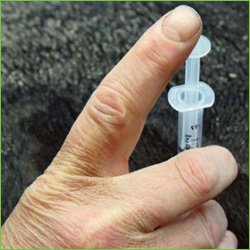Pharmaceutical options for equine pain management
There are many different pharmaceuticals (drugs) that can be used for the treatment of pain in horses.
| Type of drug | Examples | Role |
|---|---|---|
| Non steroidal anti-inflammatory drugs (NSAIDs) | phenylbutazone, flunixin, meclofenamic acid, meloxicam | Potent anti-inflammatories and analgesics. These are the most effective and commonly used drugs for pain relief in horses. |
| Opioids | pethidine morphine, butorphanol, fentanyl | Act on the central nervous system. |
| Alpha 2 adrenergic agonists | detomidine, xylazine, romifidine | Potent sedatives more commonly used for sedation, but have the added benefit of providing analgesia. |
| Local anaesthetics | mepivacaine, lignocaine, procaine, prilocaine, bupivicaine | Numb the area by blocking impulse transmission in nerves. |
| Dissociative agent | ketamine | Used more often at sub-anaesthetic doses to produce analgesia. |
| Corticosteroids | dexamethasone | Not strictly analgesic drugs, but have very potent anti-inflammatory properties. |
These drugs are often used simultaneously. For example, by using NSAIDs in addition to opioids, a better analgesia can be achieved and the vet may reduce the opioid dose by as much as one-third.
The different ways of administering pharmaceuticals
The different routes of administration can be used to optimise analgesia. The choice will depend on circumstances and the desired effect. The various routes include:
The Number 1 choice for vets and owners
Non-steroidal anti-inflammatories (NSAIDs), particularly phenylbutazone, have long been the primary choice of vets and owners for the treatment of orthopaedic inflammation and pain in horses. These conditions include musculo-skeletal disorders such as lameness, osteoarthritis and laminitis. They are considered to be effective and safe in the short and long term.
Pre-operative Analgesia

A horse will almost invariably receive analgesics before undergoing a routine or emergency surgical procedure.
A surgical incision will cause tissue damage, inflammation and subsequent pain. By giving adequate levels of analgesics prior to surgery, pain will be minimised both during and after the procedure.

